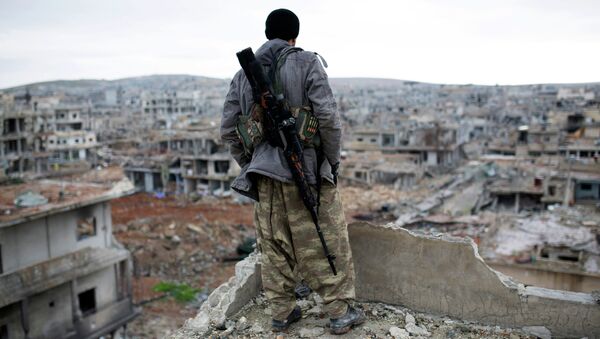The Hazm movement had received anti-tank missiles and training from the US and was frequently pointed to as an example of the “moderate” opposition to Syrian President Bashar al-Assad the United States could safely support.
The group suffered heavy losses after some fierce fighting against the al-Nusra Front (JAN), an Islamist rebel group on the US terror list and linked to Al-Qaeda. Though the al-Nusra Front is Islamist, it has generally been seen as less extremist than, and more of a rival to, the Islamic State.
— Raja Abdulrahim (@RajaAbdulrahim) March 1, 2015
Hazm — whose name means “determination” — was the principal, but not the only Syrian opposition group the US was supporting. The Free Syrian Army (FSA) is made up of various elements, and one group within it — Fursan al-Haq — is still receiving support from the US.
What’s left of Hazm has said it will join the Shamiah Front, defending rebel territory around Aleppo. Within that Front, there are moderate elements — such as the Mujaheedin Army, which is linked to the Muslim Brotherhood — but there are also more extreme Salafist factions.
— U.S. Dept. of Fear (@FearDept) March 1, 2015
Fighters Taking Their Weapons to Extremists
The Syrian Revolutionary Front, another US-backed group, and Hazm were both fighting in the northern province of Idlib in late 2014 when they surrendered to the al-Nusra Front. The SRF disbanded completely, but parts of Hazm remained intact. In a development that called into question US’ claims of “vetting” moderate rebels, some members of both groups defected to join the al-Nusra Front — along with weaponry put in their hands by the US.
— Charles Lister (@Charles_Lister) March 2, 2015
The al-Nusra Front shifted to target US-backed moderate groups after a series of US air strikes on al-Nusra targets. Hazm even issued a statement denouncing the bombing campaign as “an attack on the revolution.” The subsequent move by al-Nusra against moderates has also gone some way towards creating warmer relations between al-Nusra and ISIS, groups that had largely been rivals in opposition to Assad.
These developments call into question the vetting process by which the US has determined who is truly “moderate” and the lending of weapons which fall into the hands of the al-Nusra Front as the moderates are defeated and possibly, into the hands of ISIS as rapprochement between the two Islamist groups looks more likely.
Former Rebel Backer, Now Backing Away
The dissolution of Hazm comes as former ambassador to Syria, Robert Ford, previously a top advocate of arming Syrian rebels, has flipped his position, saying that the US-backed rebels are disorganized, and are “very much fighting defensive battles.” In other words, they’re losing.
“We have to deal with reality as it is,” Ford told McClatchy. “The people we have backed have not been strong enough to hold their ground against the Nusra Front.”
Ford’s also worried about their collaboration with the Al Nusra Front and the possibility that US arms will continue to fall into extremists’ hands.
“For a long time, we have looked the other way while the Nusra Front and armed groups on the ground, some of whom are getting help from us, have coordinated in military operations against the regime,” Ford said at a seminar in January. “I think the days of us looking the other way are finished.”
Just a few months ago, Ford was singing a very different tune.
“Don’t believe everything you read in the media,” he wrote in an op-ed in Foreign Policy. “The moderate rebels of Syria are not finished. They have gained ground in different parts of the country and have broken publicly with both the al Qaida affiliate operating there and the jihadists of the Islamic State.”
— Sarah Leah Whitson (@sarahleah1) March 2, 2015
— CFR (@CFR_org) March 2, 2015
Still Training Moderates — to Oppose ISIS, then Assad
At the same moment as this blow to US strategy in Syria, the administration has announced the beginning of another round of training for moderate rebels in Turkey, though that country’s commitment has been called into question. US Intelligence chief James Clapper recently testified before Congress about threats facing the US and was asked if he was optimistic that Turkey would become “more engaged.”
“No, I’m not,” said Clapper, claiming that the country “has other priorities and other interests” such as growing power of Kurdish groups fighting along the country’s border.
While the Turkish government has said training will start on Sunday, Pentagon spokesman Rear Adm. John Kirby has said “actual training” will start in 4 to 6 weeks.
— CFR (@CFR_org) March 2, 2015
James Clapper, in a talk at the Council on Foreign Relations said that time was the limiting factor in building up a force of moderate rebels.
"The issue is the time it is going to take… to get the… firepower that will have an impact," he said.
And in a conflict that looks to be boiling down to Assad on the one hand and Islamic extremists on the other, Clapper said that the Islamic State is the main focus of US concern in the region.
“The priority for us right now is ISIL, acknowledging the fact that at some point Assad’s gotta go because…the magnet for all this extremism that has found its way to Syria is because of him.”




